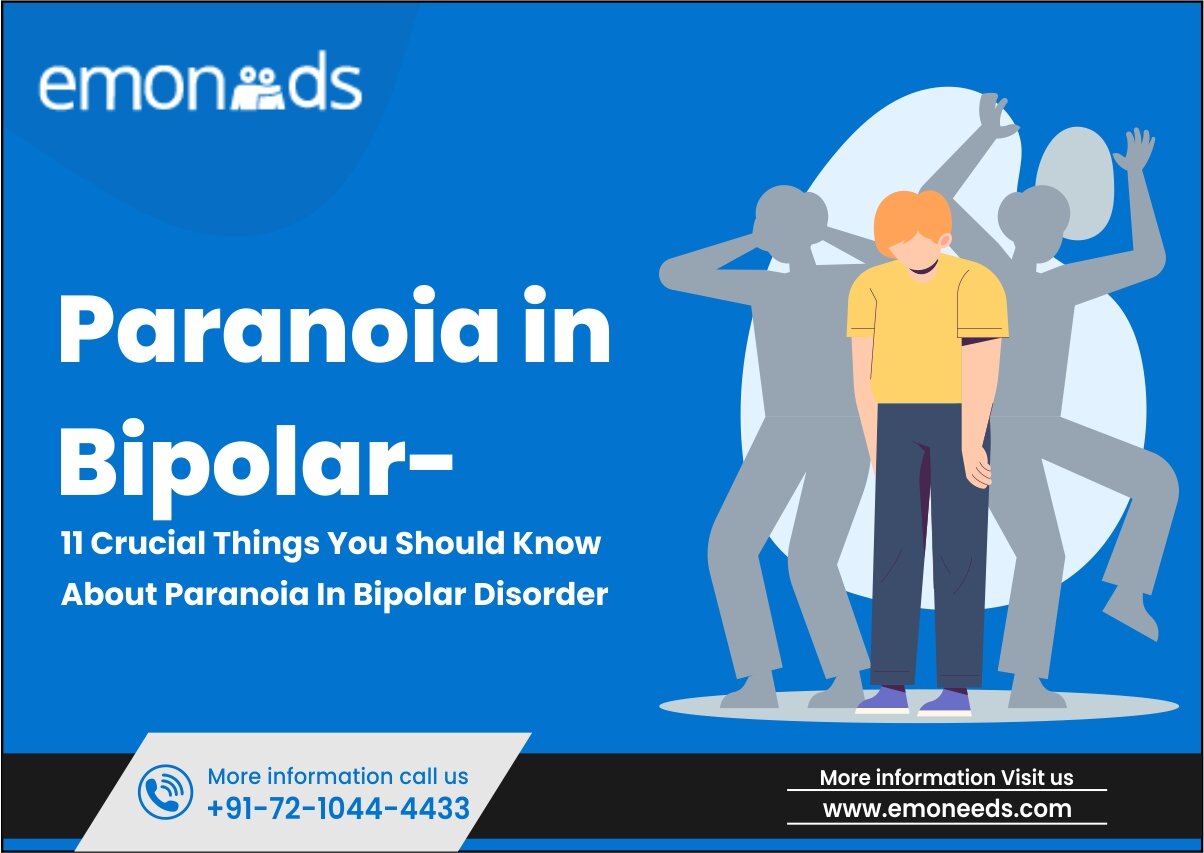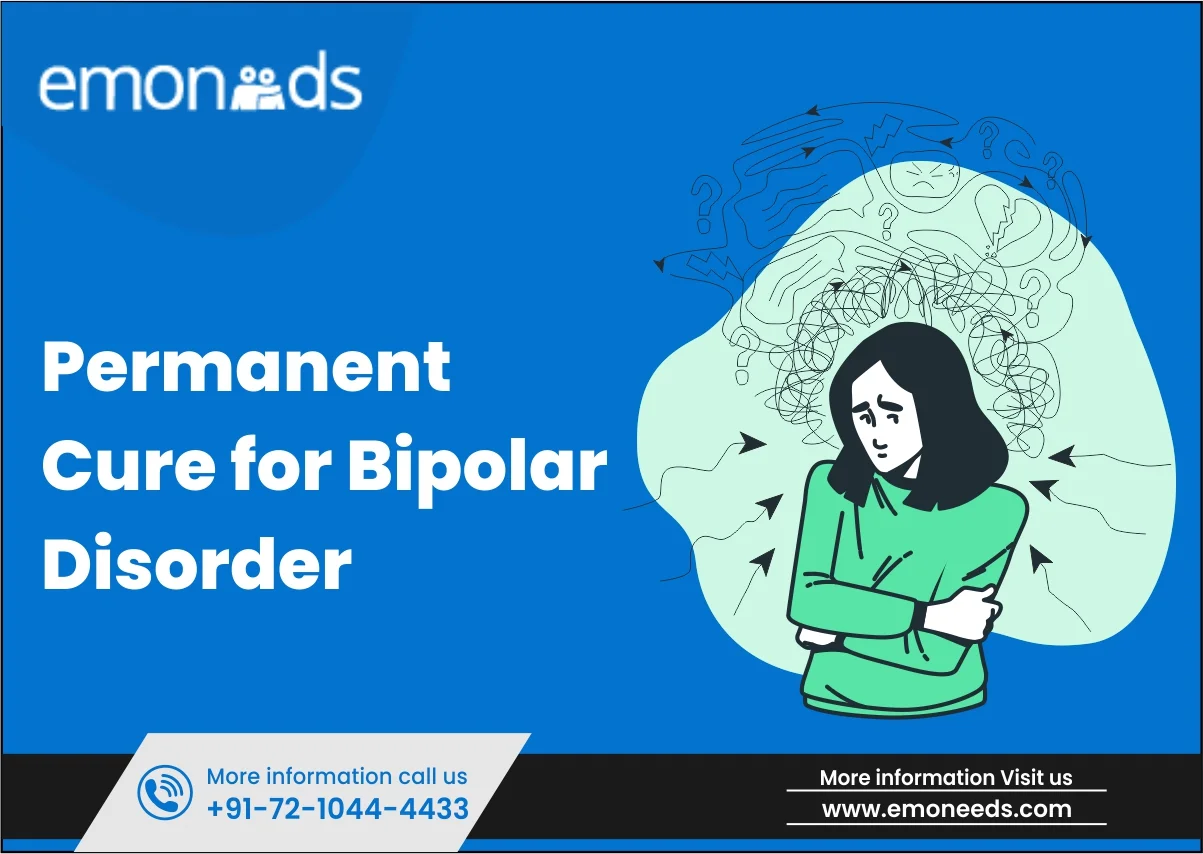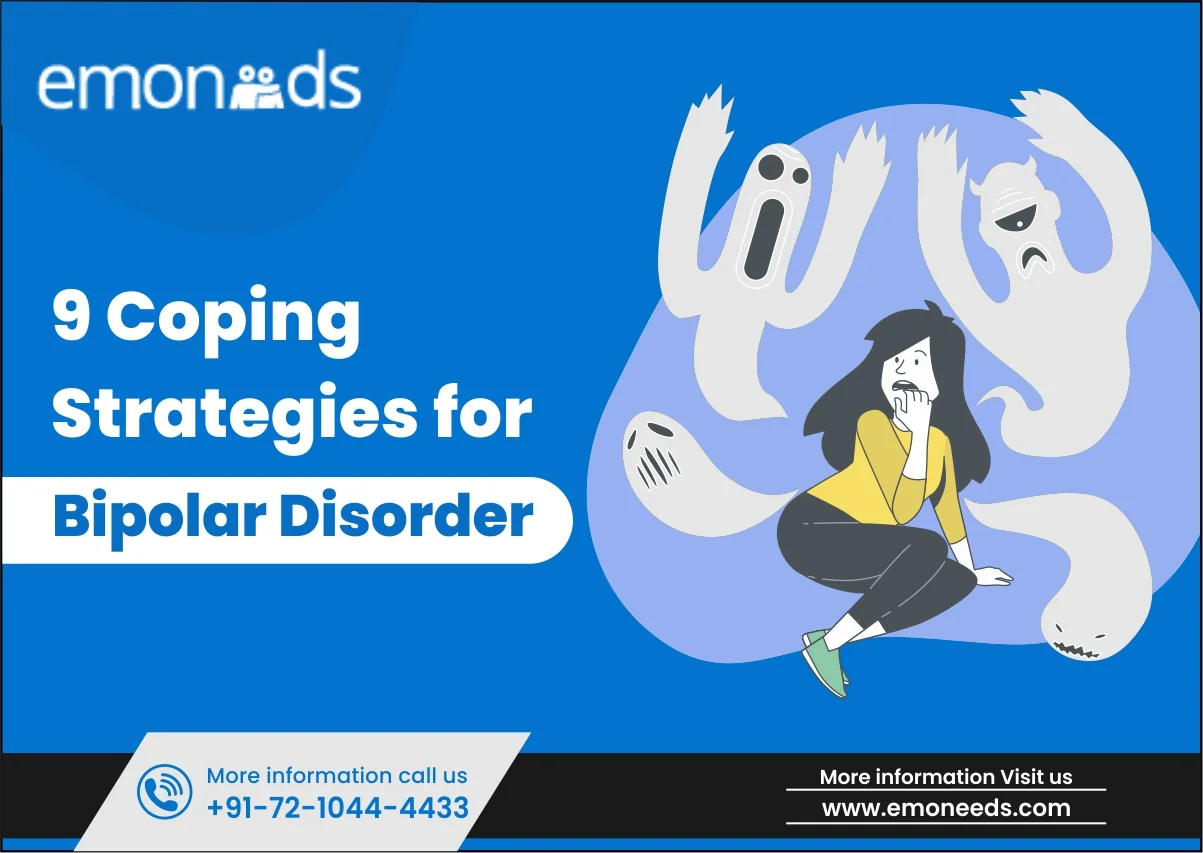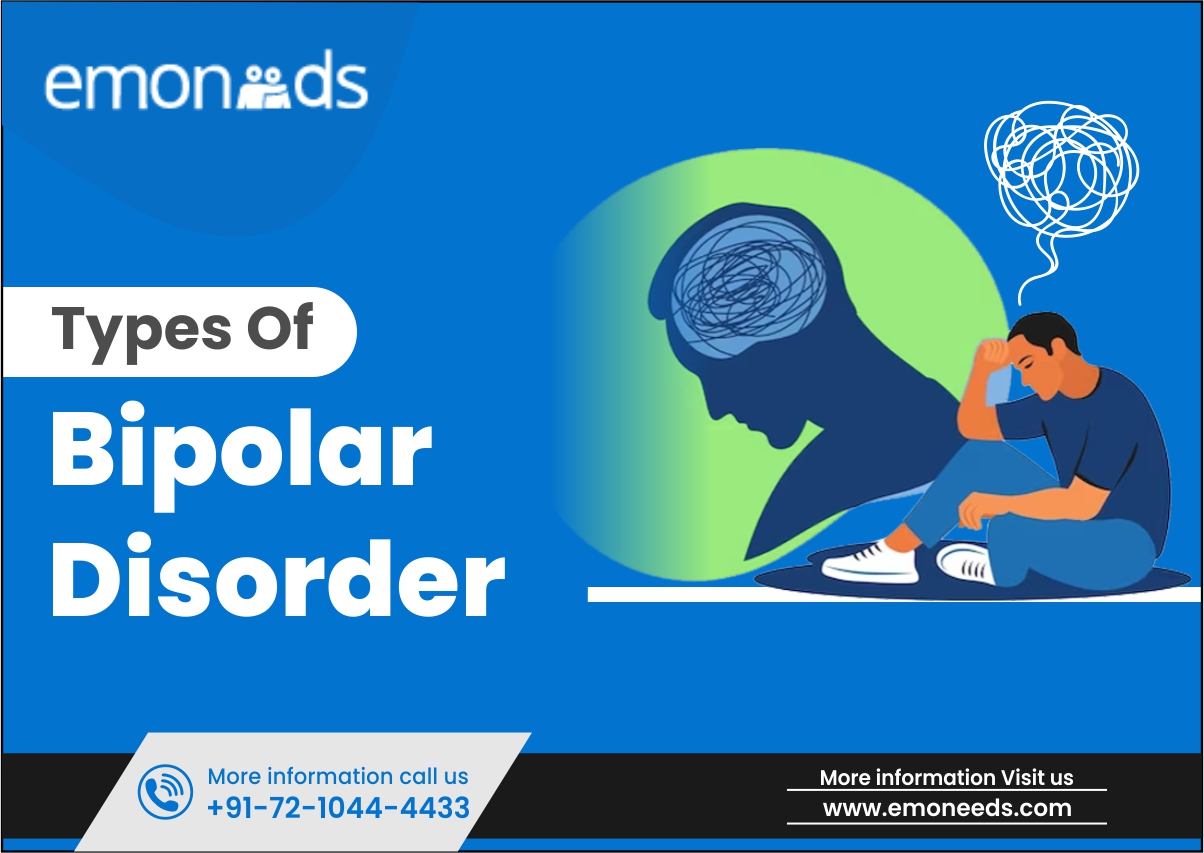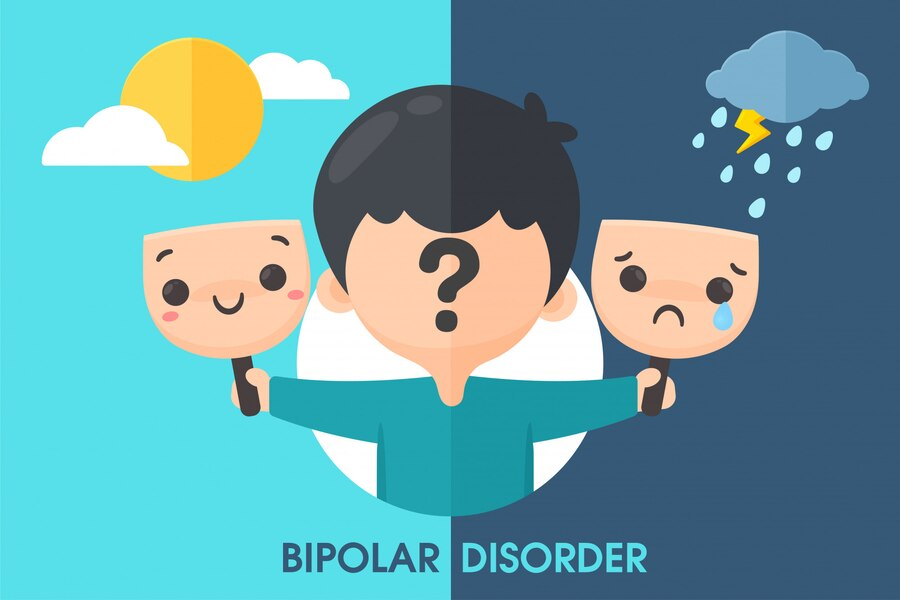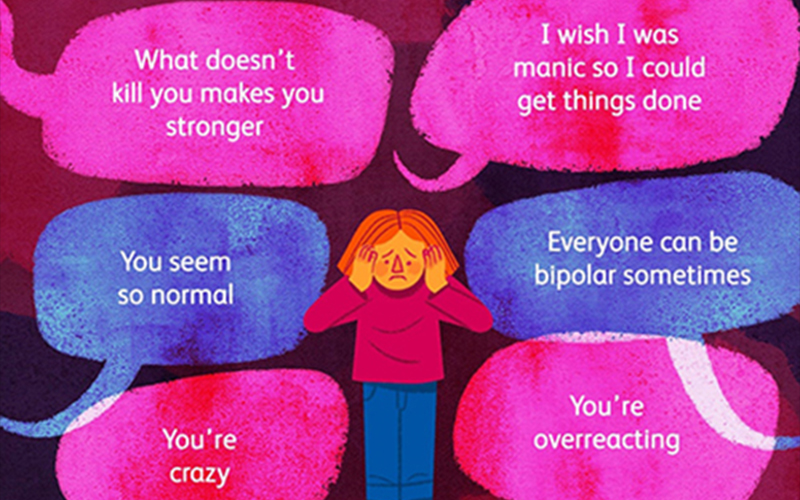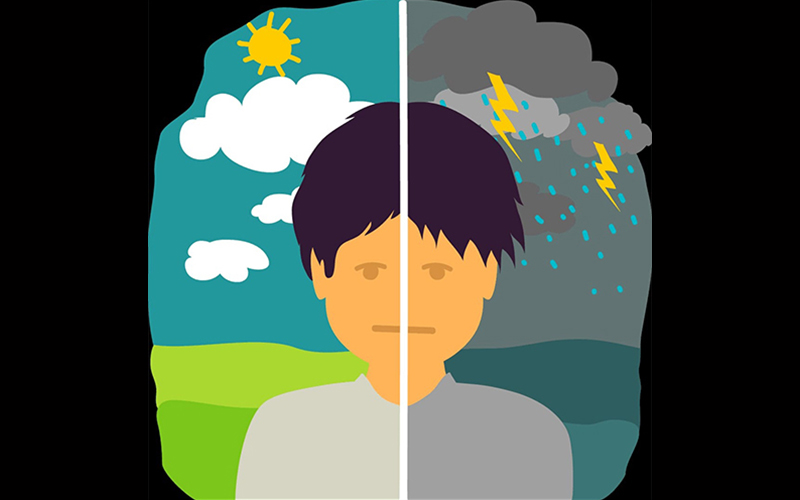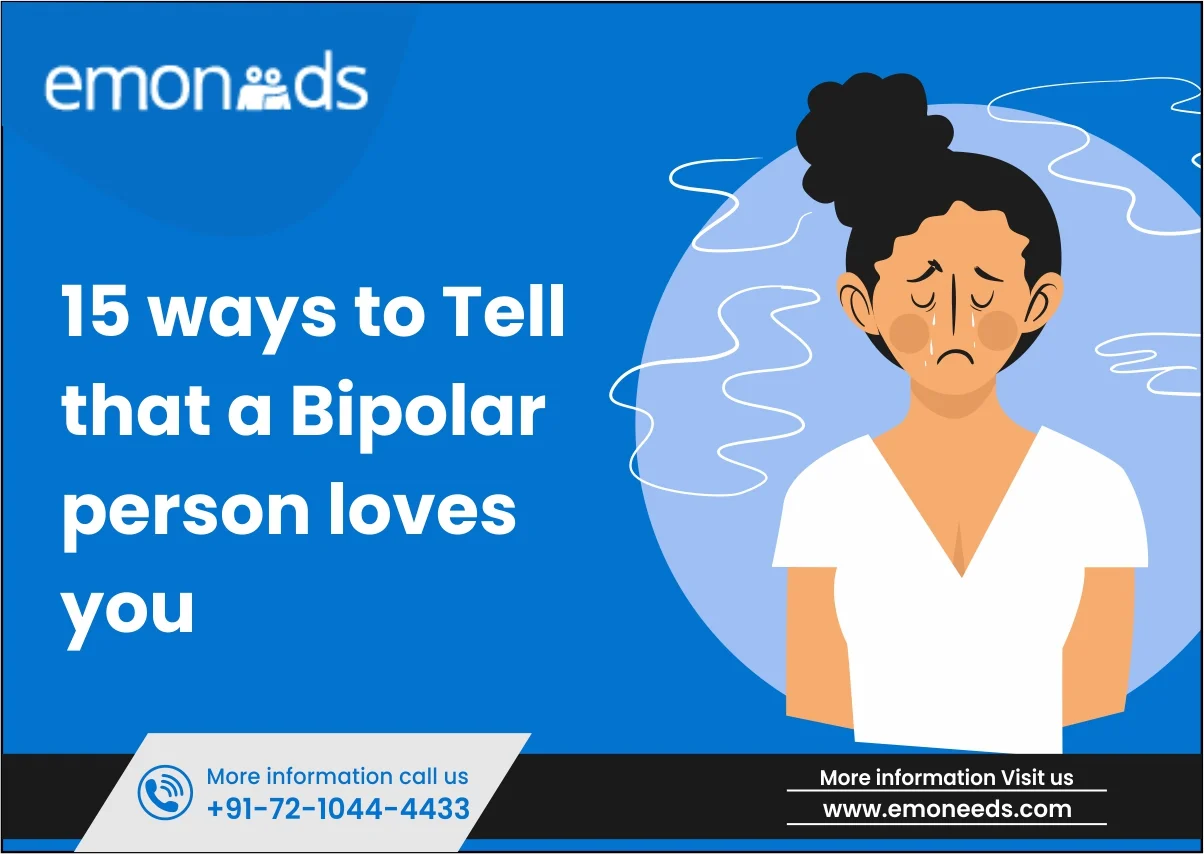
“How to tell if a bipolar man loves you?” This is a common question among individuals dating a person who has bipolar disorder.
If you, too, are in a relationship with a bipolar person, these “15 Ways To Tell That A Bipolar Person Loves You” will help you. You can also consult our specialist at Emoneeds to get the expert Advice.
Understanding these subtleties helps us appreciate the depth of affection, even with the complexities involved. This understanding encourages empathy, strengthens connections, and highlights the essential role of love in relationships affected by bipolar disorder. Emoneeds shares an insightful exploration of how love manifests in individuals suffering from bipolar disorder.
Understanding Bipolar Disorder
Bipolar disorder, a complex mental health condition, is marked by extreme mood swings that range from emotional highs (mania or hypomania) to lows (depression). These fluctuations in mood and energy levels often disrupt daily life and can profoundly impact relationships.
Also Read- Bipolar Disorder Meaning In Hindi? इसके कारण और लक्षण
Emotional Fluctuations
Individuals with bipolar disorder experience intense emotional highs, characterized by elevated moods, high energy, and impulsive behavior during manic episodes. Conversely, depressive episodes manifest as overwhelming sadness, lethargy, and feelings of hopelessness.
Challenges in Relationships
The unpredictable nature of these mood swings can pose significant challenges in relationships. Partners may struggle to manage the shifts in emotions, which can lead to misunderstandings or feelings of instability.
Impact of Love and Relationships
- Love and relationships play a crucial role in the lives of individuals managing bipolar disorder. Supportive and understanding relationships can serve as a source of stability and comfort during challenging times.
- However, the condition’s fluctuations may also affect how individuals express and perceive love, creating unique dynamics within relationships that require patience, empathy, and understanding from both partners.
The existence of bipolar disorder within relationships demands empathy, open communication, and a willingness to adapt and support each other through the emotional rollercoaster this condition brings.
Also Read- Coping with Bipolar Disorder
15 Ways To Tell That A Bipolar Person Loves You
Living in a relationship with someone who has bipolar disorder can be both rewarding and challenging. Understanding the signs of love in such dynamics is crucial for fostering a supportive and fulfilling connection. Here are fifteen nuanced indications that reveal deep affection from a person managing bipolar disorder:
Consistent Communication
Consistent and meaningful communication in a relationship with a bipolar individual holds immense significance. It acts as a bridge, fostering a deeper understanding and connection between partners. This communication transcends the highs and lows of bipolar disorder, symbolizing unwavering dedication and affection. For instance, daily check-ins or regular heartfelt conversations, regardless of mood swings, demonstrate an invested effort in maintaining closeness.
In challenging times, such communication becomes an anchor, providing stability and support. This consistency manifests in various forms, from thoughtful messages during low phases to engaging discussions during stable periods. These instances reflect the commitment to nurturing the relationship despite the unpredictable nature of bipolar disorder. Clear and open communication signifies not only love but also a willingness to solve the complexities together, reinforcing trust and strengthening the bond between partners.
Emotional Transparency
Emotional transparency within a relationship, especially with a bipolar individual, holds profound significance. It serves as a beacon of trust and closeness, showcasing a deep emotional connection. Despite the unpredictable nature of mood swings, their willingness to openly share feelings illustrates a commitment to honesty and vulnerability.
For example, during high-energy manic phases or depressive lows, their openness about emotions—be it joy, despair, or vulnerability—lays bare their authentic self, fostering a stronger bond. Picture moments of sincere conversations amidst emotional fluctuations, where they openly express thoughts and feelings. These instances of emotional transparency underscore a genuine desire for closeness and authenticity, forming the bedrock of a relationship based on mutual understanding and trust.
Supportive Behavior
During manic or depressive episodes, a bipolar individual’s supportive actions exhibit care. They might engage in active listening, offering comfort, or practical aid to alleviate distress. For instance, during a depressive phase, they might offer emotional support by being present or gently encouraging them to seek professional help. In manic episodes, they might help in organizing tasks or gently redirecting energy into positive outlets. Anecdotes often reveal their willingness to adapt and support amid mood swings.
For instance, providing reassurance during anxiety or staying calm during an outburst signifies their commitment. These instances highlight their capacity to offer varied forms of support, showcasing their dedication to fostering a stable and caring relationship despite the challenges posed by bipolar disorder.
Respectful Boundaries
In relationships with a bipolar individual, their respect for personal boundaries, even amidst mood shifts, holds immense importance. This behavior signifies their profound understanding of the need for personal space within the relationship, irrespective of their emotional fluctuations. For instance, during manic or depressive episodes, they might consciously acknowledge the necessity of allowing space, demonstrating a mature approach that fosters mutual respect and understanding.
An example could be when a bipolar partner, amidst their high-energy phase, recognizes and respects their partner’s need for solitude or time alone, refraining from intruding upon that space. Similarly, during low mood periods, they might acknowledge their partner’s need for emotional space and offer support without imposing themselves. This respect for boundaries reflects a level of emotional maturity, nurturing a healthy relationship dynamic built on mutual respect and consideration.
Efforts in Stability
In a relationship with a bipolar individual, their dedication to stability amid mood fluctuations signifies a profound commitment. Despite the inherent challenges, they strive to maintain equilibrium within the relationship. This effort manifests in various ways, such as consistent routines to manage mood swings or actively seeking strategies to minimize the impact of mood shifts on the relationship.
For instance, they might proactively communicate their emotional state to ensure clarity and understanding or practice self-care techniques to regulate their mood. Their willingness to learn and implement coping mechanisms demonstrates a genuine commitment to stability. These efforts, though not always smooth, underline their earnest endeavor to foster a steady and supportive environment within the relationship amidst the unpredictable nature of bipolar disorder.
Expression of Affection
A bipolar individual’s expression of love transcends mood fluctuations. Their gestures vary, yet their affection remains unwavering. Amidst highs and lows, they may express love through heartfelt words, thoughtful acts, or simply being present. For instance, during high-energy phases, they might plan spontaneous outings or shower you with affectionate messages. In contrast, during low periods, they might offer quiet support, a comforting touch, or heartfelt notes. Despite mood swings, their love endures, manifesting in myriad ways that assure you of their unwavering affection.
These expressions, though diverse, consistently reflect their genuine care and devotion to the relationship. Understanding and cherishing these moments reinforce the enduring strength of their love despite the challenges posed by bipolar disorder.
Active Listening
Active listening, pivotal in relationships with someone managing bipolar disorder, signifies deep care and connection. Their attentive and empathetic listening, even amid emotional fluctuations, underscores their commitment to understanding. For instance, during manic phases, they might attentively listen, grasping underlying emotions.
Similarly, during depressive episodes, their empathetic ear offers solace. Their ability to engage in active listening across varying emotional states showcases unwavering support and a desire to comprehend your feelings. This attentive approach, irrespective of mood swings, signifies a genuine effort to connect and empathize, nurturing a stronger bond within the relationship.
Empathy and Understanding
Their ability to grasp your viewpoint and extend empathy serves as a profound sign of affection. Amidst the tumult of bipolar challenges, their empathetic responses illuminate their profound care. For instance, during tough times, their genuine concern and understanding, irrespective of mood swings, showcase their heartfelt empathy. One might recall moments when, despite their own emotional struggles, they actively listened and acknowledged your feelings, offering comfort and support.
Their empathetic gestures, whether in joy or sorrow, mirror a deep emotional connection, revealing their commitment to understanding your emotions. These instances of heartfelt empathy underscore their sincere effort to comprehend and resonate with your feelings, solidifying the bond between you despite the complexities of bipolar disorder.
Consideration of Triggers
A healthy relationship with someone experiencing bipolar disorder requires a nuanced understanding of triggers that influence mood swings. A partner’s consideration and proactive efforts in managing these triggers reflect a deep sense of care and concern for the relationship’s well-being. In such instances, you may witness a thoughtful approach to creating an environment that minimizes potential triggers, showcasing a commitment to fostering a stable and harmonious connection.
This might involve open communication about specific triggers, collaborative problem-solving to mitigate their impact, or the implementation of coping strategies. Through these efforts, the individual demonstrates a profound dedication to sustaining a supportive and understanding relationship and tackling bipolar challenges with empathy and commitment.
Thoughtful Gestures
In relationships with individuals managing bipolar disorder, their thoughtful gestures often stand out, portraying a deep sense of care. These gestures manifest in various ways, such as small yet meaningful acts or grand displays of affection. For instance, during a manic phase, planning surprise outings or crafting personalized gifts showcases their creativity and dedication. In depressive episodes, they might express care through empathetic notes or gentle reassurance, demonstrating their sensitivity and thoughtfulness.
Furthermore, their consistent efforts to remember important dates or preferences despite mood swings exemplify their commitment to the relationship. These gestures, whether big or small, signify their genuine affection and desire to contribute positively to the relationship, adding layers of warmth and consideration to the bond.
Commitment and Loyalty
In a relationship with someone managing bipolar disorder, their commitment and unwavering loyalty speak volumes about their dedication to nurturing a healthy bond. Despite the challenges posed by mood swings, their steadfast devotion remains constant. For instance, during tough times, their unwavering support and readiness to manage difficult situations together illustrate their loyalty. They prioritize the relationship’s stability, ensuring their partner feels valued and supported throughout the highs and lows of bipolar disorder.
Their dedication transcends the disorder, emphasizing their commitment to fostering a strong and enduring partnership. Their consistency in showing loyalty, irrespective of mood fluctuations, underlines their sincere efforts to sustain a loving and committed relationship. These actions signify their profound dedication and loyalty, essential elements in fostering a supportive and enduring connection.
Efforts in Self-Improvement
Their dedication to personal growth amid bipolar challenges signals affection in the relationship. Despite the hurdles posed by bipolar disorder, their commitment to self-improvement showcases a deep investment in bettering themselves for the relationship’s benefit. This dedication might manifest through therapy attendance, embracing coping strategies, or actively engaging in activities promoting mental wellness.
It reflects their resilience and determination to resolve personal challenges, ultimately benefiting the relationship. Their proactive stance in overcoming obstacles demonstrates a sincere desire to enhance themselves, contributing positively to the partnership’s strength and fostering a more resilient and supportive bond.
Consistent Efforts in the Relationship
A bipolar individual’s consistent efforts to nurture a relationship are pivotal. Despite mood fluctuations, their unwavering commitment speaks volumes about their dedication. They actively invest in the relationship, ensuring its growth and stability. Small yet significant gestures, like checking in during tough times or expressing appreciation, showcase their ongoing dedication.
For instance, during manic phases, they might prioritize quality time or, during depressive episodes, offer unwavering emotional support. These consistent efforts, tailored to each phase, foster a sense of security and strengthen the bond. Their commitment, evident through daily actions, underscores the profound value they place on the relationship’s wellbeing.
Feeling Loved and Valued
Amidst the trials of bipolar disorder, feeling loved and valued profoundly impacts a relationship. It’s about the unwavering assurance that despite the complexities, love remains unwavering. For instance, during challenging mood swings, their consistent reassurance and support echo this feeling.
Simple yet profound gestures, like gentle affirmations during tumultuous times or steadfast support during lows, embody this sense of being loved and valued. It’s in those moments of vulnerability and understanding that the essence of genuine affection shines through, reassuring that despite the disorder’s challenges, love remains the anchor, providing solace and strength.
Seeking Professional Help Together
Seeking professional help together signifies a robust commitment in a relationship with someone managing bipolar disorder. It underscores a shared dedication to fostering a healthy and supportive environment. For instance, actively participating in therapy sessions or consultations as a couple illustrates a proactive approach to addressing challenges.
Attending counseling sessions together, discussing coping strategies, and exploring ways to manage bipolar symptoms collectively showcase a united front. This shared endeavor not only strengthens understanding but also fortifies the relationship’s foundation, enhancing mutual support and resilience in facing bipolar challenges as a team.
Conclusion
Recognizing love from someone managing bipolar disorder involves valuing consistent communication, emotional transparency, and unwavering support. Encourage empathy and understanding in these relationships, acknowledging the unique challenges faced. Extend support and patience, fostering a connection based on trust and shared experiences.
For comprehensive assistance in managing bipolar relationships, consider Emoneeds—an empathetic ally providing tailored support and professional guidance. Embrace the journey together, fostering a relationship grounded in compassion and resilience. Take the step towards a more supported and connected life with Emoneeds.
FAQs
How a person with bipolar thinks in relationships?
In relationships, someone with bipolar may experience intense mood swings. They might feel overly excited and happy (mania) at times, leading to impulsive actions or risky behavior. Other times, they might feel extremely down and hopeless (depression), struggling with low energy and motivation. These shifts can affect their communication and ability to maintain stable connections. Understanding and patience from partners are crucial, along with open dialogue and support systems to navigate the challenges together.
Can a bipolar person be faithful?
Yes, a bipolar person can be faithful. Being faithful depends on factors like personal values, communication, and commitment, not just mental health. With proper support, understanding, and treatment, many bipolar individuals maintain healthy relationships and remain faithful to their partners. Both partners need to seek help when needed and work together to strengthen their bond. With dedication and effort, faithfulness is achievable for anyone, including those with bipolar disorder.
Why do bipolar push partner away?
Bipolar disorder can cause mood swings, including periods of intense highs (mania) and lows (depression). During manic episodes, a person may feel overconfident, impulsive, or irritable, which can strain relationships. They might push their partner away due to feelings of being misunderstood or overwhelmed. In depressive episodes, they may withdraw or isolate themselves. Understanding and support from loved ones, along with effective treatment, can help manage symptoms and improve relationship dynamics.
Do bipolar people fall in love?
Yes, people with bipolar disorder can fall in love just like anyone else. Love is a natural emotion that everyone experiences, regardless of their mental health condition. However, bipolar disorder may affect how they manage their relationships. Individuals with bipolar disorder need to communicate openly with their partners and seek support from healthcare professionals to maintain healthy relationships. With understanding and proper management, people with bipolar disorder can experience fulfilling and loving relationships.
When a bipolar person ignores you?
When someone with bipolar disorder ignores you, it can feel hurtful and confusing. Remember, it might not be about you. Bipolar disorder can cause shifts in mood and energy levels, affecting how people interact. They might need space or struggle to communicate during certain episodes. It’s essential to be patient and understanding. Reach out calmly, but respect their boundaries. Encourage them to seek support from loved ones or professionals if needed. Showing empathy and support can make a difference.
